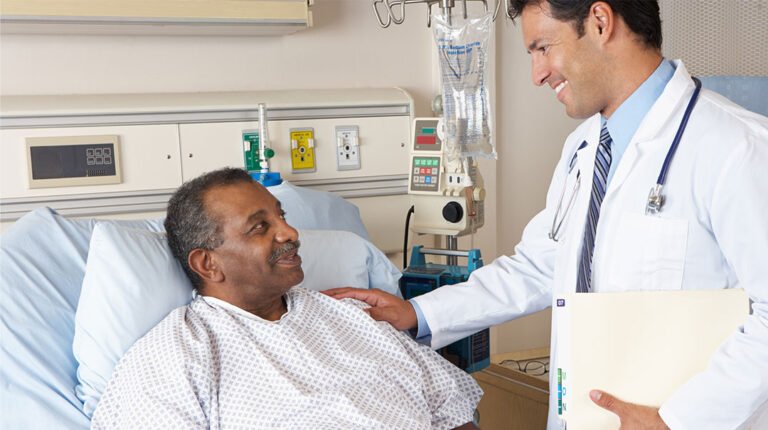Receiving a diagnosis of bladder cancer often means a change of life; the health of your body, the state of your mind, and your social networks are all affected by this challenge. Moreover, psychosocial support from the doctors and caregivers from the best cancer hospital in India is needed as an extra aid that helps people deal more effectively with the problems that they may face at the diagnosis stage, treatment, and survivorship. Personification and clinical needs of bladder cancer patients will be evident when support is offered based on their condition, and the quality of life of the patients will also be improved sustainably.
The Psychosocial Impact
Bladder cancer diagnosis and treatment can raise a number of emotions, such as fear, anxiety, depression, anger, discouragement, and sorrow. Patients may find it difficult to cope with the uncertainty of their future, living with body changes instilled by surgery, and psychological distress due to treatment methods that cause urinary incontinence or sexual dysfunction. These responses can be seen to affect many aspects of life, including relationships with people at work and daily activities.
Another essential aspect of being supported by fellow bladder cancer patients is social support. However, one of many may encounter social network deterioration because of treatment programmability, one’s physical conditions, or stigmas associated with their condition. Someone enclosed in emptiness and surrounded by the negativity of their own mind would have emotional deterioration, which would have a strong link to their overall mental status.
Addressing Psychosocial Needs
Healthcare providers such as nurses, oncologists, and psychologists serve a significant function in helping people living with bladder cancer with their psychosocial problems. Implementing the evaluation of emotional status at every patient care session gives healthcare professionals enough chance to recognize patients who need to be provided with additional services to support them.
Psychosocial interventions tailored to bladder cancer patients may include:
Counseling and Therapy: Through individual or group counseling, patients can learn to handle emotional stress, master coping mechanisms, and develop better interpersonal communication skills, among other important things. CBT techniques can prove to be highly effective in exploring adjustment issues related to anxiety and depression.
Support Groups: Being part of the support group helps bladder cancer patients get distracted from difficult experiences and share working methods with others. Also, they could gain mutual support. The groups can be either in-person or virtual, which means that patients can choose an option that is convenient for them, whether they live far away or are ill.
Education and Information: Accurate and comprehensive information about bladder cancer, its various treatment possibilities, and expected side effects not only helps to alleviate concerns and stress but also inculcates confidence in these patients to make an effective and educated decision. Education materials may also help people overcome practical issues, such as money and transport.
Lifestyle Support: Promoting healthy lifestyle customs like daily physical exercises, nutritional balance, and stress management techniques could be the change needed to heal disease and improve therapies completely. Additionally, patients can be guided by apps for nutrition counseling or physical therapy, which may assist them in preserving their quality of life during and beyond treatment.
Peer Mentorship Programs: In the case of newly diagnosed bladder cancer patients, a person who has been able to overcome similar challenges can help find both emotional support and practical advice. They can hope for the best. Besides, peer mentors act as inspiration and support for the patients, thus making them more resistant and empowered.
Challenges and Future Directions
Although psychosocial support services provide many positive effects to bladder cancer patients, there are still some problems with spreading them and making them available and accessible on a whole scale. The limited resources, locating of funds, or access to healthcare services by various communities may impede the establishment of more all-encompassing support systems, especially in regions that are underserved.
Future efforts to enhance psychosocial support for bladder cancer patients should focus on:
A psychosocial care unit could be an integrated part of routine oncology practice through a multidisciplinary care team model and survivorship care plans.
Developing educational programs specifies the way doctors must attach great importance to addressing psychosocial needs while providing supportive care interventions.
Exploiting technology in order to extend virtual assistance as well to the telehealth counseling sessions in case they are accessed.
By putting forward policies to regulators and calling for various reforms of the healthcare system to make psychosocial support a priority and giving communities that lack these facilities a chance too.
Conclusion
Psychosocial support as a whole is a crucial aspect of multimodal care for bladder cancer patients that embraces their emotional, social, and practical challenges arising during and after the therapy sessions. Through the incorporation of psychosocial interventions into the clinical work and partnership building of healthcare practitioners from the Best ayurvedic cancer treatment in India, researchers, policymakers, and advocacy organizations, we can ensure improved quality of life and outcomes for bladder cancer patients. As a team, we can offer the needed support and resources to the patient during the course of the battle against the disease, with the hope of a cure.




0 Comments